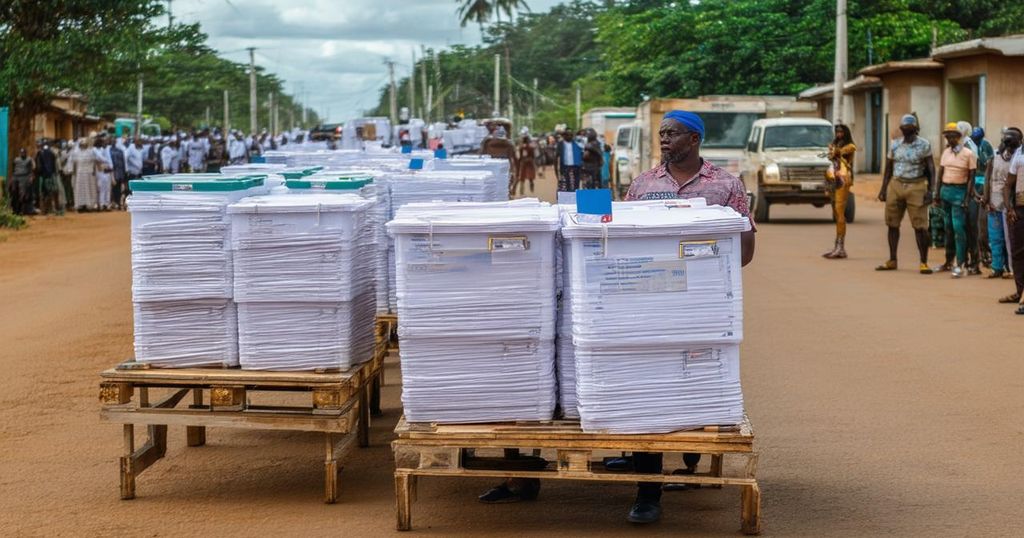Mozambique Election Results: Frelimo Declares Victory Amidst Claims of Fraud

The ruling Frelimo party’s candidate, Daniel Chapo, has been declared the winner of Mozambique’s presidential elections, securing over 70 percent of the votes amid allegations of electoral fraud from opposition parties, particularly from Venancio Mondlane. The EU observer mission noted serious procedural concerns, and the political atmosphere is tense due to recent violent incidents involving opposition members.
Mozambique’s ruling party, Frelimo, has announced that its presidential candidate, Daniel Chapo, has emerged victorious in the recent presidential elections, securing over 70 percent of the votes, as confirmed by the National Election Commission (CNE). Despite this declaration, significant allegations of electoral fraud have been raised by opposition parties. Chapo’s main rival, Venancio Mondlane, who ran as an independent candidate, garnered more than 20 percent of the votes and has asserted that he was the true winner, claiming extensive manipulation of the election results in favor of Frelimo. The third-place candidate, Ossufo Momade of the Renamo party, managed to acquire over five percent of the votes. This electoral victory extends Frelimo’s longstanding dominance in Mozambique, where the party has held power for nearly 50 years since the country gained independence from Portugal in 1975. Following liberation, Mozambique experienced a protracted civil war against Renamo, which later transitioned into the primary opposition party. Chapo, who is 47 and will assume the presidency in January, is noted for being the first president to be born after Mozambique’s independence. In light of the disputed election results, Mondlane has called for nationwide protests against the ruling party’s prolonged governance. He urged supporters via social media to participate in demonstrations, stating, “The time has come for the people to take power and say that we now want to change the history of this country.” The credibility of the electoral process has been further undermined by concerns raised by an EU observer mission, which reported that certain observers were denied access to oversee vote counting in various locations, and noted instances of “unjustified alteration” of election results at several polling stations. Opposition leaders have consistently accused Frelimo of electoral malpractice since the voting occurred. This heightened political tension follows a disturbing incident involving the assassination of Elvino Dias, an advisor to Mondlane, and another individual affiliated with the Podemos party. These murders, allegedly perpetrated by armed assailants, have led to accusations against the security forces by Mondlane. The police have launched an investigation into these tragic events, which Frelimo has denounced as heinous acts. Further unrest erupted as police employed teargas to disperse opposition protests against the election’s legitimacy.
The current political landscape in Mozambique is characterized by the long-lasting dominance of the Frelimo party, which has governed since the country achieved independence in 1975. The party’s stronghold has been challenged by the Renamo party, which originally emerged as a rebel group during the civil war and has transitioned into the main opposition. The current elections, marked by accusations of electoral fraud and violence against opposition members, have raised questions about the integrity of the electoral process and the future of democracy in Mozambique. These events are occurring against a backdrop of political violence and unrest that have defined Mozambican politics for decades.
In conclusion, the results of the recent presidential election in Mozambique have reaffirmed the ruling Frelimo party’s grip on power, despite widespread allegations of electoral fraud and calls for protests from opposition leaders. The controversy surrounding the election underscores ongoing challenges to democracy in Mozambique, particularly in light of recent violent incidents affecting opposition figures. As the country moves forward, the legitimacy of the electoral process and the safety of dissenters will be critical points of concern. Going forward, it remains essential for the international community to closely monitor the situation in Mozambique as it navigates these tumultuous political waters.
Original Source: www.aljazeera.com







